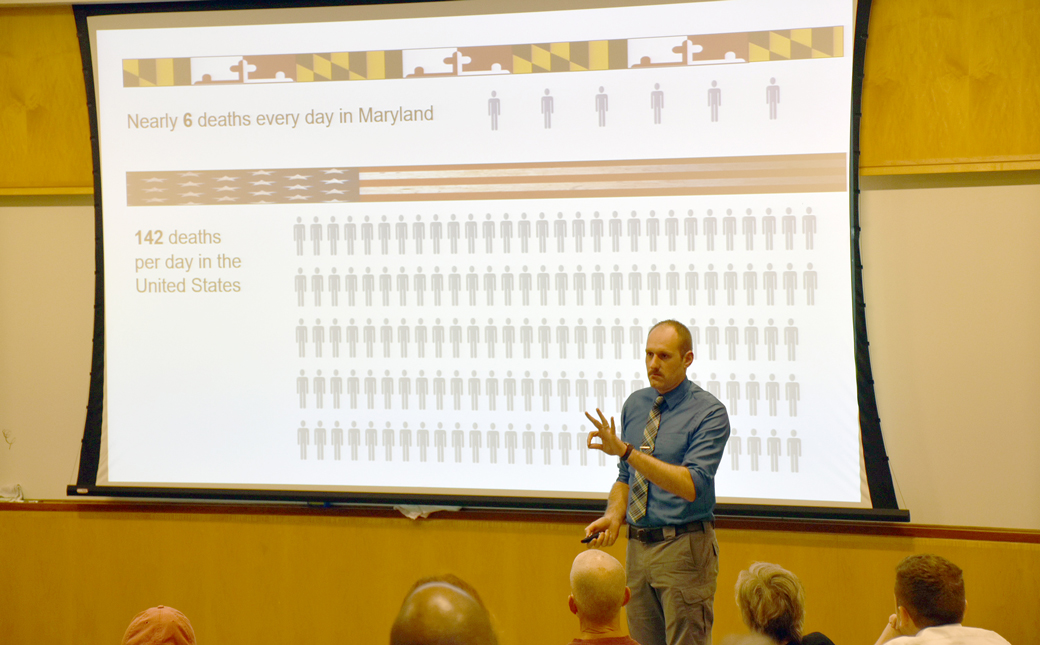Speaker Series Addresses Opioid Crisis’ Threat to National Security
State expert stresses importance of agency coordination and community involvement in combatting epidemic
By Kelly Nagle on November 10, 2017

Three years ago Birch Barron received a call from an Oregon Social Worker. The worker informed him that an immediate family member had been arrested for heroin possession. That story was how Barron, now deputy director of Maryland’s Opioid Operation Command Center (OOCC), began his presentation at Towson University’s Edward V. Badolato Distinguished Speaker Series on Thursday.
Fortunately, Barron’s story was one that ended in hope and recovery — his relative has been sober for more than two-and-a-half years. But it quickly reminded the audience that each statistic released about the growing amount of opioid-related deaths in our country is more than just a number; those statistics represent lives lost, families devastated and communities shattered.
Six people in the state of Maryland die from opioid addiction every day. Nationwide, that number increases to 142 Americans, a death toll of equal to the 9/11 attacks occurring every three weeks. These numbers have consistently increased over the past five years with people dying at unprecedented rates primarily due to heroin’s synthetic cousin fentanyl. This opioid is 100 times more potent than morphine and when illegally blended with other drugs, it can quickly turn a functioning addicts’ typical dose into a deadly one.
“This is a crisis that impacts every walk of life, every age group, every race and ethnicity, every gender,” Barron said. “A lot of things kill people every day—car accidents, cardiac arrest—but the cascading effects opioid addiction has on American communities—emergency management systems, EMS teams, schools, the economy—is what has turned this crisis into a national threat.”
On March 1, Maryland Governor Larry Hogan declared a state of emergency for the opioid crisis and dedicated a supplemental budget of $50 million in new funding over a five-year period to support prevention, recovery and enforcement efforts.
The OOCC coordinates and drives priorities across Maryland state agencies including health and human services, education and public safety entities. While OOCC pushes evidence based practices in an effort to create a consistent approach across the state, Opioid Intervention Teams were stood up in each jurisdiction to identify their own priorities and gaps so they can hit their communities where it will make the biggest difference. One of those places is college campuses.
“There are so many ways that higher education can be involved in the solution,” Barron said. “Not just by educating their students on the dangers, but also making sure their staff and students are trained to respond should an incident occur. These institutions are shaping the medical professionals, social workers and leaders of tomorrow. We want students to enter their prospective fields prepared to combat the challenges that we are seeing today.”
Learn more about Maryland’s efforts to combat the opioid crisis.
Three steps Barron suggested to individuals who want to make an impact on this crisis today were:
- Becoming naloxone (Narcan) trained;
- Asking doctors the right questions as a patient;
- Reducing the stigma associated with opioid addiction by talking openly with family and friends about risks and resources.
He also urged professionals to elevate the conversation by putting pressure on private and public-sector leadership to continue pursuing solutions, supporting their local Opioid Intervention Teams and making sure colleagues and staff have the information and resources to stay healthy and safe.
Joseph R. Clark, assistant professor and program director for Towson University’s Integrated Homeland Security Management, was pleased to see a healthy turnout of students, community members and emergency response professionals in attendance.
“At Towson University, we try to not only focus on how we can support our students, but also the leaders in our surrounding community, city and state-at-large,” Clark said. “The goal of the Badolato Speaker Series is to broaden the definition of homeland security beyond terrorism and natural disasters. We are thrilled to provide this free public forum so students and community members have the opportunity to connect, discuss these critical threats and identify solutions.”
The Edward V. Badolato Distinguished Speaker Series is endowed by the late Colonel Edward V. Badolato, USMC. Badolato graduated from Towson University and served under former Presidents Ronald Reagan and George H.W. Bush as Deputy Assistant Secretary of the Department of Energy, specializing in counter-terrorism and emergency planning. Colonel Badolato was an internationally recognized expert in the field of energy and environmental operations, contingency planning and emergency response.
This story is one of several related to President Kim Schatzel's priorities for Towson University: TU Matters to Maryland, BTU: Partnerships at Work for Greater Baltimore and Strategic Plan Alignment.